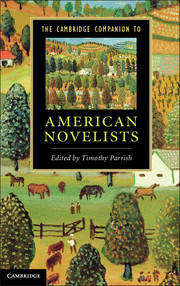Book contents
- Frontmatter
- Contents
- Contributors
- Introduction
- 1 James Fenimore Cooper
- 2 Nathaniel Hawthorne
- 3 Herman Melville
- 4 Harriet Beecher Stowe
- 5 Mark Twain
- 6 Henry James
- 7 Edith Wharton
- 8 Theodore Dreiser
- 9 Willa Cather
- 10 F. Scott Fitzgerald
- 11 Ernest Hemingway
- 12 William Faulkner
- 13 Henry Roth
- 14 Djuna Barnes
- 15 Zora Neale Hurston
- 16 Richard Wright
- 17 Raymond Chandler
- 18 Ralph Ellison
- 19 J. D. Salinger
- 20 Patricia Highsmith
- 21 Vladimir Nabokov
- 22 Jack Kerouac
- 23 Saul Bellow
- 24 Kurt Vonnegut
- 25 John Updike
- 26 Thomas Pynchon
- 27 Toni Morrison
- 28 Philip Roth
- 29 Don DeLillo
- 30 Cormac McCarthy
- Guide to Further Reading
- Index
- References
3 - Herman Melville
Published online by Cambridge University Press: 05 December 2012
- Frontmatter
- Contents
- Contributors
- Introduction
- 1 James Fenimore Cooper
- 2 Nathaniel Hawthorne
- 3 Herman Melville
- 4 Harriet Beecher Stowe
- 5 Mark Twain
- 6 Henry James
- 7 Edith Wharton
- 8 Theodore Dreiser
- 9 Willa Cather
- 10 F. Scott Fitzgerald
- 11 Ernest Hemingway
- 12 William Faulkner
- 13 Henry Roth
- 14 Djuna Barnes
- 15 Zora Neale Hurston
- 16 Richard Wright
- 17 Raymond Chandler
- 18 Ralph Ellison
- 19 J. D. Salinger
- 20 Patricia Highsmith
- 21 Vladimir Nabokov
- 22 Jack Kerouac
- 23 Saul Bellow
- 24 Kurt Vonnegut
- 25 John Updike
- 26 Thomas Pynchon
- 27 Toni Morrison
- 28 Philip Roth
- 29 Don DeLillo
- 30 Cormac McCarthy
- Guide to Further Reading
- Index
- References
Summary
Though I wrote the Gospels in this century, I should die in the gutter.
Melville to Nathaniel Hawthorne, 1851In 1849, as he was arranging for the publication of his third novel, Mardi, Herman Melville (1819–91) wrote to his friend Evert Duyckinck, editor of the Literary World. The topic of discussion was Melville’s reaction to hearing Emerson lecture at the Freeman Place Chapel in Boston. “Emerson is more than a brilliant fellow,” the young author explained. “To my surprise I found him quite intelligible.” Emerson might be a fool, “full of transcendentalisms, myths & oracular gibberish,” but he was at least a fool who “dives”: “I love all men who dive. Any fish can swim near the surface, but it takes a great whale to go down stairs five miles or more; & if he dont [sic] attain the bottom, why, all the lead in Galena can’t fashion the plummet that will.” “Thought-divers” – this was the term Melville reserved for the writers who impressed him as unrestrained in their pursuit of difficult truths. Shakespeare stood at the head of the class as “the profoundest of thinkers,” capable of “those occasional flashings-forth of the intuitive Truth in him; those short, quick probings at the very axis of reality.” But even Shakespeare could feel the pressures of political or cultural restraint. If only he had been an American:
I would to God Shakspeare [sic] had lived later, & promenaded in Broadway. Not that I might have had the pleasure of leaving my card for him at the Astor, or made merry with him over a bowl of the fine Duyckinck punch; but that the muzzle which all men wore on their souls in the Elizebethan [sic] day, might not have intercepted Shakspere’s [sic] full articulations. For I hold it a verity, that even Shakspeare, was not a frank man to the uttermost. And, indeed, who in this intolerant Universe is, or can be? But the Declaration of Independence makes a difference.
(C, 122)- Type
- Chapter
- Information
- The Cambridge Companion to American Novelists , pp. 22 - 31Publisher: Cambridge University PressPrint publication year: 2012

